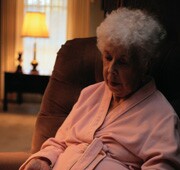Sleep Needs May Decline With Age
Study suggests what some think is insomnia is really natural part of getting older.
By Alan Mozes
HealthDay Reporter
|
E-mail this article
Subscribe to news
Printer friendly version
|

(SOURCES: Elizabeth Klerman, M.D., Ph.D., assistant professor, medicine, division of sleep medicine, Brigham and Women's Hospital, and Harvard Medical School, Boston; Gregg Jacobs, M.D., sleep specialist, Sleep Disorders Center, University of Massachusetts Memorial Medical Center, Worcester; July 24, 2008, Current Biology, online)
THURSDAY, July 24 (HealthDay News) -- The reason healthy adults sleep less in their 60s than they did in their 20s might simply be because people need less sleep as they age, new research suggests.
If true, the observation could mean that what many elderly people interpret as insomnia could be a completely normal reflection of an age-related shift in their internal clock.
"Older people may simply need less sleep than younger people," said study author Dr. Elizabeth Klerman, an assistant professor of medicine in the division of sleep medicine at Brigham and Women's Hospital in Boston. "It could turn out to be that they have more trouble falling asleep. But it could also, in fact, be that they get what they need in less time. We just don't know the reason yet."
Klerman and her colleague Dr. Derk-Jan Dijk, of the University of Surrey in the United Kingdom, reported the findings in the July 24 online issue of Current Biology and were expected to be published in the Aug. 5 print edition of the journal.
To gauge the relationship between sleep and age, the researchers compared sleep behavior between a group of 35 men and women between the ages of 18 and 32 with that of 18 men and women between the ages of 60 and 72.
All the participants were healthy and had no prior sleep disturbance issues. All were required to remain in bed for 16 hours a day -- 12 hours at night, and four during the day -- for three to seven days.
The younger group ended up sleeping more during the study than during their normal routine.
That said, the older group was found to sleep 1.5 hours less per day on average than the younger group: nearly 7.5 hours versus nearly 9 hours. The authors noted that the sleep dip among the elderly was equally split between time spent dreaming (called REM sleep) and non-REM sleep.
"The older patients did take longer to fall asleep than younger people," she noted. "And it could also be the case that they have an unrecognized sleep disorder interfering with their restful sleep at night. But we just can't tell yet whether it's a question of inability to sleep or capacity to sleep."
Yet, even as Klerman and her colleagues continue their efforts to unravel the mystery, Dr. Gregg Jacobs, a sleep specialist with the Sleep Disorders Center at University of Massachusetts Memorial Medical Center, is already describing the study as "the best I've seen to date on the physiology of older people's sleep."
"This study addresses a real need, because most of the research on sleep debt is focused on college students, but most people with sleep issues are middle-aged and older adults," he observed. "And, in terms of older people, this study seems to indicate that our drive for sleep goes down as we age."
"Part of it is that older people don't expend as much energy as younger adults," Jacobs said. "And also, older people tend to nap more and tend to spread their sleep out more over the course of a 24-hour period. So, maybe they just don't need as much sleep at night."
"So, the idea that we need eight hours of sleep at night may be more relevant to younger people," he added. "And if so, we shouldn't automatically be telling older people to take sleeping pills or seek medical attention if they're sleeping less than eight hours. Because getting less may be the natural consequence of aging."
More information
For details on sleep and the aging, visit the U.S. National Institute on Aging.
Copyright © 2008 ScoutNews, LLC. All rights reserved. 
HealthDayNews articles are derived from various sources and do not reflect federal policy. healthfinder.gov does not endorse opinions, products, or services that may appear in news stories. For more information on health topics in the news, visit the healthfinder.gov health library.